Geotechnical Investigations
- Standard Penetration Test (SPT)
- Cone Penetration Test (CPT)
- Seismic Cone Penetration Test (SCPT)
- Seismic Downhole Test (SDHT)
- GeoHazard Analysys
Standard Penetration Test (SPT)
Field Test
The standard penetration test (SPT) is an in-situ dynamic penetration test designed to provide information on geotechnical engineering properties of soil. We use high efficient Rotary Drilling Rig and follow ASTM D1586 – 18 test procedure.
Experiences:
- CDA Flyover (50+ Boreholes),
- Rajuk Urban Resilience Project (378 boreholes),
- WFP lake dam protection project,
- Jhilmil Residential Park Project (200 boreholes).
- Rohinga Camp, RMG Factories, housing projects, Paper industries etc.
GEOTECHNICAL LABORATORY TESTS
Geotechnical laboratory has always been a concern for foundation engineers in Bangladesh, as most of the geotechnical laboratory lacks in Quality and standards in testing. Eventually these tests produce unreliable geotechnical information. As an engineering consultancy firm, Environment and Infrastructure Management Solution (EIMS) took it as a challenge and it introduced its sister concern Smart Development Engineering (SDE) Limited with highly professional team of geotechnical engineers and technician and efficient laboratory facilities.
Smart Development Engineering (SDE) Limited, a sister concern of EIMS Limited, has been involved is Geotechnical Investigation and Laboratory Testing since 2015. From then SDE develops its capacity and strength it's resource with training from international experts. The laboratory test has been praised by national and international scientists from filed of geotechnical investigation and foundation design.
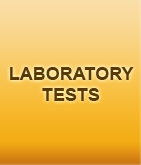
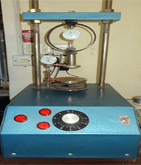
Unconfined Compression Testing Machine
Consolidation Machine
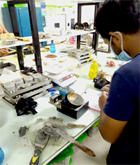
Liquid Limit (Casagrande Device)
Direct Shear Machine
Sieve Set and Oven
LIST OF LABORATORY TESTS IN SDE LAB, CAPACITY AND RELEVANT TEST STANDARDS
Moisture Content
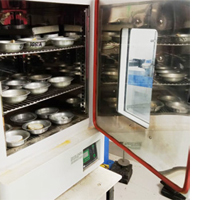
 Standard: ASTM
D2216 – 98
Standard: ASTM
D2216 – 98  Number of Equipment:
Weight machine – 10 Nos.
Number of Equipment:
Weight machine – 10 Nos.
Oven – 6 Nos. Temperature: 110°±5°C
Temperature: 110°±5°C
Moisture or Water Content (of a material) the ratio expressed as a percent of the mass of "pore" or "free" water in a given mass of material to the mass of the solid material.
Wet Sieve Analysis
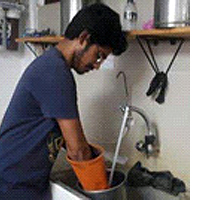
 Standard: ASTM D 1140 – 00
Standard: ASTM D 1140 – 00 Number of Equipment:
Number of Equipment:
Sieve Set- 6 Nos.
Sieve Shaker- 4 Nos.
Wet sieving is a method to separate the coarse material with water or another type of liquid before drying, identifying and analyzing. In this process, the sample is washed through the sieve stack.
Sieve Analysis
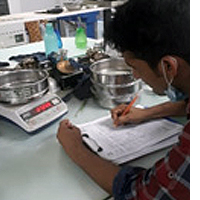
 Standard: ASTM D 422 – 63, ASTM D 6913 – 04
Standard: ASTM D 422 – 63, ASTM D 6913 – 04 Number of Equipment:
Number of Equipment:
Sieve Set- 6 Nos.
Sieve Shaker- 4 Nos. Generate gradation curve.
Generate gradation curve.
Sieve analysis is a determination of the proportions of particles lying within certain size ranges in a granular material by separation on sieves of different size openings.
Shrinkage Limit
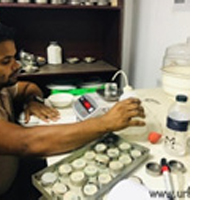
 Standard: ASTM D
4943 – 08
Standard: ASTM D
4943 – 08 Number of Equipment:
Number of Equipment:
Shrinkage Dish- 52 Nos.
Evaluates the water content of a soil where further loss of moisture will not result in an additional volume reduction.
Liquid Limit & Plastic Limit
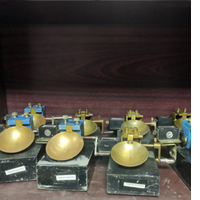
 Standard: ASTM
D4318 – 05
Standard: ASTM
D4318 – 05 Number of Equipment:
Number of Equipment:
Casagrande apparatus – 9 Nos.
To distinguish between silt and clay, and to distinguish between different types of silts and clays.
Direct Shear Test
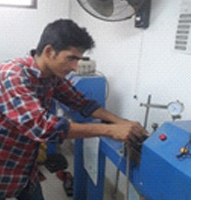
 Standard: ASTM
D3080/D3080M –11
Standard: ASTM
D3080/D3080M –11 Number of
Equipment:
Number of
Equipment:
DST apparatus – 2 Nos.
This test method covers the determination of the consolidated drained shear strength of one specimen of a soil material under direct shear boundary conditions.
Hydrometer Analysis
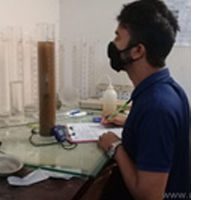
 Standard: ASTM D 422 – 63, ASTM D7928 – 17
Standard: ASTM D 422 – 63, ASTM D7928 – 17 Number of Equipment:
Number of Equipment:
6 Nos.
The sedimentation or hydrometer method is used to determine the particle-size distribution (gradation) of the material that is finer than the No. 200 (75-μm) sieve and larger than about 0.2-μm.
Specific Gravity
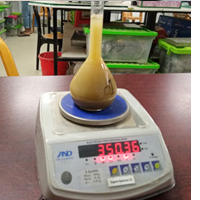
 Standard: ASTM D
854 – 02
Standard: ASTM D
854 – 02 Number of
Equipment:
Number of
Equipment:
Pycnometer – 6 Nos.
Specific gravity of soil solids, Gs, n - the ratio of the mass of a unit volume of a soil solids to the mass of the same volume of gas-free distilled water at 20°C. From this test, we understand how porous the soil is and how saturated the soil is with water.
Unconfined Compression Test
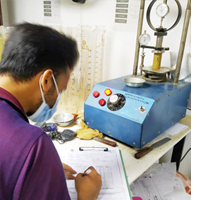
 Standard: ASTM
D2166/D2166M – 13
Standard: ASTM
D2166/D2166M – 13 Number of Equipment:
Number of Equipment:
UCT machine- 1 Nos.
 The primary purpose of Unconfined Compression Test
is to determine the unconfined compressive strength, which is then used to calculate the unconsolidated undrained shear strength of the clay under unconfined conditions.
The primary purpose of Unconfined Compression Test
is to determine the unconfined compressive strength, which is then used to calculate the unconsolidated undrained shear strength of the clay under unconfined conditions.
One Dimensional Consolidation Test
 Standard: ASTM
D2435/ D2435M – 11
Standard: ASTM
D2435/ D2435M – 11 Number of Equipment:
Number of Equipment:
Consolidation machine – 15 Nos.
The gradual reduction in volume of a soil mass resulting from an increase in compressive stress to determine the rate and magnitude of soil consolidation when the soil is restrained laterally and loaded axially.
Lab technicians after continuous capacity development trainings.
CONE PENETRATION TEST (CPT) &
SEISMIC CONE PENETRATION TEST (SCPT)
The cone penetration test (CPT) is used to determine the geotechnical engineering properties of soils. Seismic CPT or SCPT is used to calculate the small strain shear modulus of the soil by measuring shear wave velocity through the soil. The machine that we use is Gouda Geo-Equipment-B.V. The capacity of this machine is 350 kN. It generates vertical & horizontal wave (P-waves & Swaves). We follow ASTM D5778 – 20 & ASTM D7400 test procedure for CPT & SCPT respectively.
Experiences:
Rajuk Urban Resilience Project.
Experiences:
Downhole seismic test is an in-situ test and determine the velocity of primary (P) and secondary (S) seismic waves to provide the elastic soil parameters. The P and S waves Velocities are used in geotechnical foundation analysis, static and dynamic soil analysis, liquefaction assessment and etc. We follow ASTM D7400 test procedure.
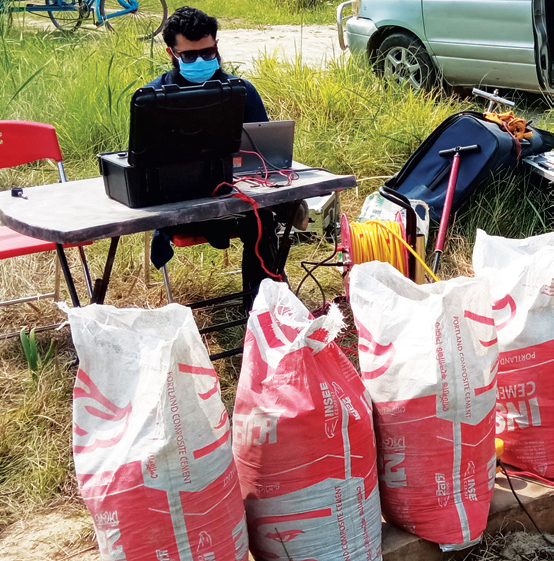

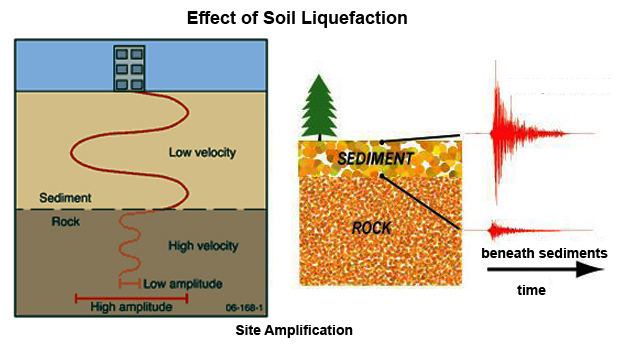
SDE have worked in several high priority projects. An overview of SDE's projects is given bellow:
City wide (DMDP area)
Geotechnical Investigation for
Completed tasks
- SPT Field and Lab test:15000m
- Seismic downhole test: 400 Nos
- Cone Penetration Test (CPT): 5000m
- Seismic Cone Penetration Test (SCPT): 400 Nos
Completed tasks
- SPT Field and Lab test:200 Nos
Geotechnical Investigation and
Seismic Vulnerability Assessment for
Jhilmil Residential Project
Completed tasks
- SPT Field and Lab test:200 Nos
- Liquefaction and Amplification analysis for the project area
Geotechnical Investigation for 2
existing Bridges in Cox's Bazar and
for 3 new walking bridges in
Rohingya Camp under WFP
Completed tasks
- SPT Field and Lab test:20 Nos
Geotechnical Investigation, Slope Stability Analysis and Dam Protection in Rohingya Camp 20 and 20 extension
Completed tasks
- SPT Field and Lab test
- Existing Sheet Pile Analysis for adequacy
- Slope Stability Assessment of existing Hill Slope
Geotechnical Investigation and Foundation Assessment for UNICEF office Building in 7 districts in Bangladesh
Completed tasks
- SPT Field and Lab test
- Foundation Analysis for existing structure
Geotechnical Investigation and
Seismic Vulnerability Assessment for
Several RMG factories (Green Textile Limited, Young One etc.
Completed tasks
- SPT Field and Lab test:200 Nos
- Liquefaction and Amplification analysis for the project area
